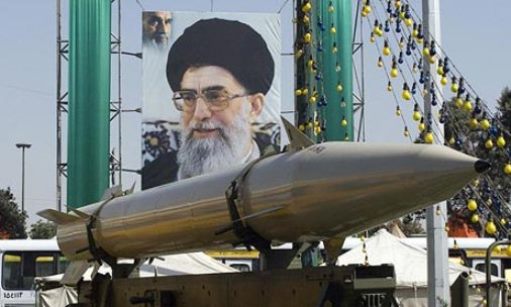Visit our Facebook page and follow us on Facebook for our latest articles!
A few months ago, the US and its partners (the so called 5+1) reached a nuclear deal with Iran in order to limit Iran’s nuclear program. While the deal may in fact have prevented Iran from owning a stockpile of nuclear warheads in the short term, it misses the real objective of an Iran nuclear deal. Few people seriously contend that Iran would have in fact placed a nuclear warhead on a ballistic missile and fired it towards the US—or even Israel. That would not have been the intent of Iran’s nuclear warheads. Rather, the advantage of nuclear warheads for Iran would have been the deterrent power that would remove any possibility of military intervention in Iran from Israel, US or the Arab nations—all while leaving Iran’s hands open to pursue its ideological goal of expanding its reach, through terrorism and otherwise, first to neighboring States and then around the world. By allowing Iran to be a nuclear threshold state with advanced nuclear knowledge and capabilities, the current deal gives Iran the tactical advantages and the deterrent power that would have come with actually having nuclear warhead, even though Iran may not actually own a stockpile of nuclear warheads. In other words, the deal gives Iran the benefits for which it wanted a bomb without actually giving Iran a bomb. That is no better for the interests of US, Israel, the Arab nations and others than actually allowing Iran to obtain nuclear warheads.
Let’s first briefly summarize the details of the deal. For 15 years, the deal will keep Iran one year away from a nuclear bomb—absent any secret activities by Iran despite decades of such secret activities. During these 15 years, Iran will be permitted to build and test advanced centrifuges. Most of these limitations will expire after the 15 years, leaving Iran as a threshold nuclear state that is capable of building nuclear warhead on short notice. What does that mean? It means that if there is any threat of war with Iran, Iran will be able to quickly become a nuclear state and effectively preclude the possibility of an outside military intervention from the US, Israel, or anyone else.
That deterrence effect is the real benefit of owning nuclear weapons, and Iran just got it with blessing from the US. By way of example, let’s look at Russia. There is little dispute that Russia is, little by little, annexing land from the now pro-Western country of Ukraine—despite the Budapest Memorandum on Security Assurances of 1994, where Russia agreed to respect the territorial integrity of Ukraine. Nevertheless, no one—even the most Hawkish of Republicans—is contemplating a direct military confrontation with Russia. The reason that Russia conducts the most egregious acts with almost blanket immunity from military retaliation is simple: nuclear deterrence. In fact, in response to even modest US military activity in Europe, Putin recently announced that it will add more than 40 intercontinental ballistic missiles to its arsenal.
That same nuclear deterrence was precisely what Iran sought, and is precisely what Iran received. Today, despite sanctions, Iran supports para-military and/or terrorist organizations in Gaza, the West Bank, Lebanon, Syria, Iraq and Yemen. The Shia-Sunni rivalry in the region is not a secret to anyone—nor is Iran’s desire to topple the Sunni, pro-Western regimes of its neighboring Arab countries. This is not a new ideology for the Islamic Republic. In the 1980s, while Iraq started a war with Iran, Iran extended the war for eight years and refused to accept any cease fires because of its one stated objective: to remove Saddam’s regime, conquer the religious city of Karbala in Iraq, and pave the way to “free” Jerusalem from Israel. That same mentality has since guided Iran through founding and supporting of Hezbollah in Lebanon, supporting Shia militia in Iraq, supporting Hamas in Gaza and West Bank, supporting Houtis in Yemen, supporting Shia protesters in Bahrain, and supporting Assad in Syria.
Until today, Iran conducted its sponsorship of terror at a high financial cost due to sanctions and with a significant risk of military intervention from the likes of Israel and Saudi Arabia. After this deal, however, the risk of most military interventions is removed simply because Iran will be able produce nuclear warheads at will and on short notice. Now with the removal of sanctions, which will significantly improve Iran’s finances, and the removal of military threats, Iran’s hands are open to pursue its support of terror around the region and to pursue its ideology of installing Shia and anti-Western governments in Arab capitals. The US didn’t hand Iran a nuclear weapon, and may in fact have prevented Iran from actually making nuclear weapons for some time to come—but that is no comfort to Iran’s neighbors. As far as they are concerned, the US might as well have handed Iran nuclear warheads. And they will have no choice but to seek comparable powers.
Share with others: